The best TV shows of 2021

The best TV shows of 2021
(Image credit: Macall B Polay/HBO / Channel 4 / BBC/James Stack)
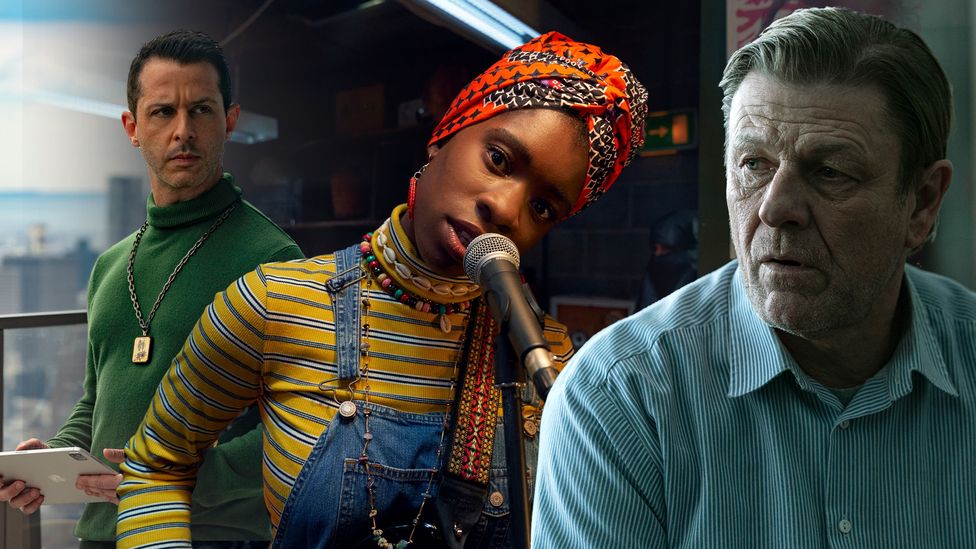
From Squid Game to Succession, Ted Lasso, Mare of Easttown and Maid, Hugh Montgomery, Amy Charles and Eddie Mullan pick the year’s greatest programmes to binge right now.
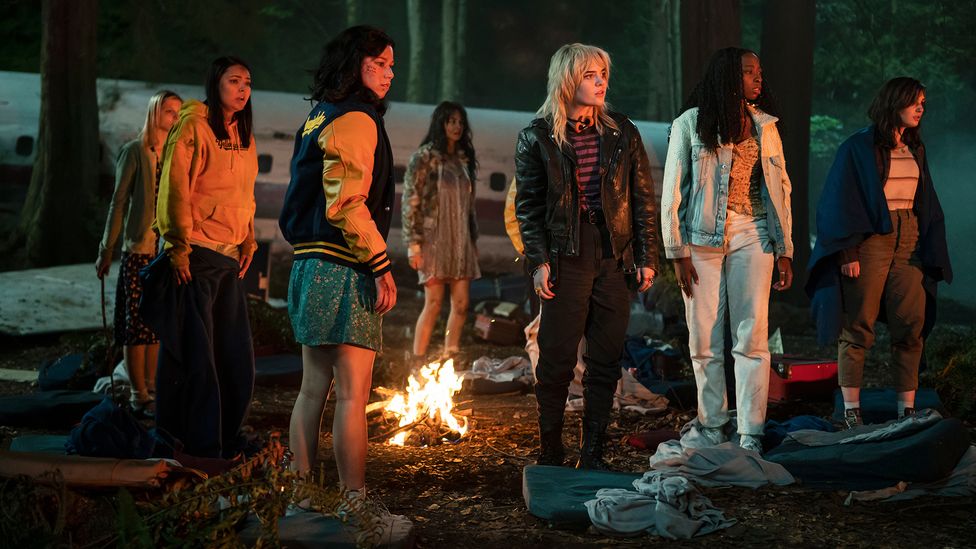
(Credit: Kailey Schwerman/ Showtime)
Yellowjackets
It’s a risky endeavour putting a show on the “best of the year” list when only half of its first season has aired so far – and yet, however it pans out, Yellowjackets is a show that already demands recognition for its verve, style and ferocity. A horror-meets-black-comedy-meets-teen-drama, it tells a split-timeline story, with both parts full of intrigue. In the mid-1990s, a plane containing a girls’ high-school soccer team from New Jersey crashes in the Canadian wilderness, leading to Lord of the Flies-style power battles among the stranded survivors. And then in the present day, we catch up with some of those survivors, now in their 40s, as they are forced to reckon with exactly what happened all those years ago. Many critics have compared it to Lost, and it certainly shares the narrative lure of that series, but it is also very much its own beast, as well as a gleefully perverse nostalgia-hit for many millennials, with its 1990s-rock soundtrack and casting of some of that era’s spikiest youth stars Christina Ricci and Juliette Lewis among the grown-up versions of the characters. And unlike Lost, which of course lost the plot as it went on, I have a feeling some satisfactory – if nasty – answers are coming. Available on Sky/Now TV in the UK and on Showtime in the US.
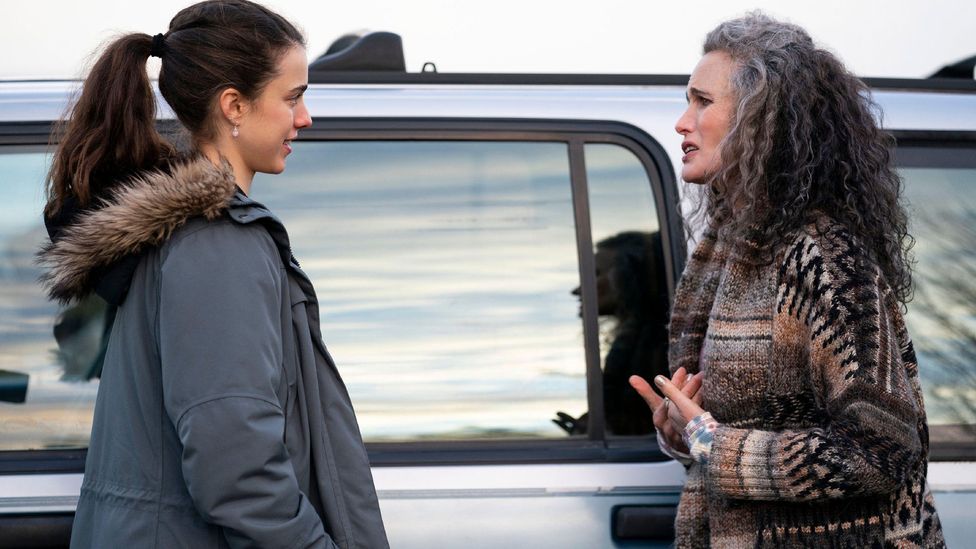
(Credit: Alamy)
Maid
Amid TV’s ongoing obsession with the lives of the super-rich or aspirationally affluent, it hardly needs saying that not enough attention is paid to those on the other end of the socio-economic spectrum: the have-nots rather than the haves. Which is what made this Netflix limited series, an adaptation of Stephanie Land’s bestselling memoir about her life as a single mother on the breadline, so welcome. Margaret Qualley plays Alex, a young woman living in the US Pacific Northwest and struggling to get a footing in society. When we first see her, she is fleeing from her abusive and alcoholic boyfriend with their young daughter, which leads her down a path of nightmare bureaucracy, as she tries to find both accommodation for the two of them and a job that might allow her to pay the bills. One of the great things about the show is the detail with which it shades in the financial and administrative obstacles of Alex’s situation, at some points offering a tally of her incomings and outgoings that flashes up on screen, while it’s equally strong on the emotional realities of dealing with abusive partners and loved ones with mental health issues – in this case, a bipolar mother, played by Qualley’s own mum Andie MacDowell. And while there is some irony in Hollywood mother-daughter royalty like MacDowell and Qualley leading a story like this, the power of their performances cannot be doubted. Altogether, it manages to hit a sweet spot between sobering authenticity and skilfully-played sentimentality that means for all that its subject matter may be harrowing, you wish you could live with these characters for a while longer. Available on Netflix internationally.
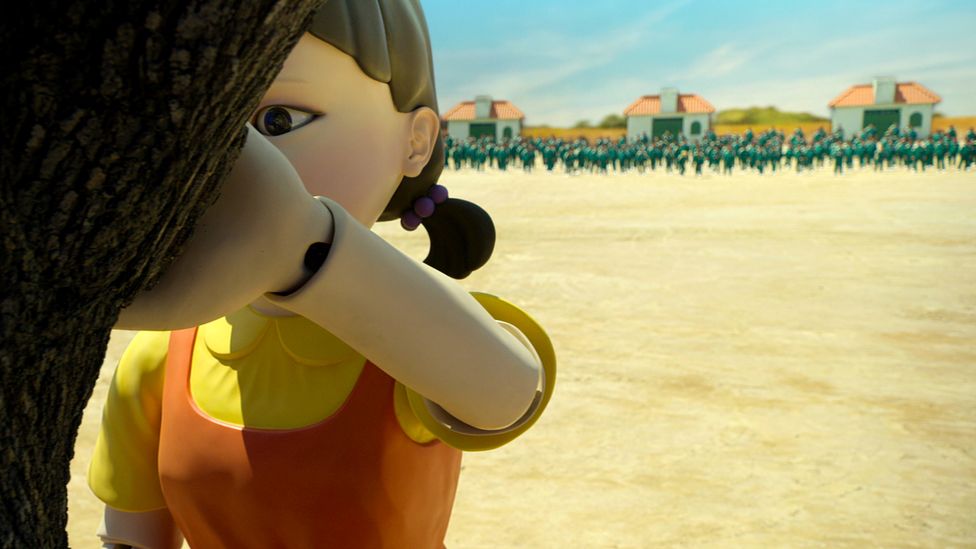
(Credit: Netflix)
Squid Game
For a rather more surreal take on the rich-poor divide, meanwhile, there was the one show that swept all before it this year: Squid Game. This South Korean drama is about desperate people in debt who sign up to compete in a series of sadistic, life-or-death takes on old playground games in order to try and win a huge cash prize. Three months on from its premiere, it is odd to think how a show that is a merciless critique of capitalism became collectively reconstituted as a kind of benignly-amusing pop cultural product, with people dressing up in the contestants’ green tracksuits for Halloween and sales in the Korean honeycomb candy – featured as the centrepiece of one trial – booming. But leaving that irony aside, the show in itself is a brilliantly-conceived near-masterpiece, whose surreal production design and twisted childhood references conspire to make it feel like something dredged from one’s subconscious, and whose writing is on occasion as beautiful as its violence is brutal. Inevitably, the fact it has become Netflix’s biggest show of all time means a second series is in the works, though whether its high-concept can sustain one is questionable. But, beyond its own future, it has impacted the future of the whole TV ecosystem by definitively proving the global reach that non-English language content can have – and for that we should all be thankful. Available on Netflix internationally.
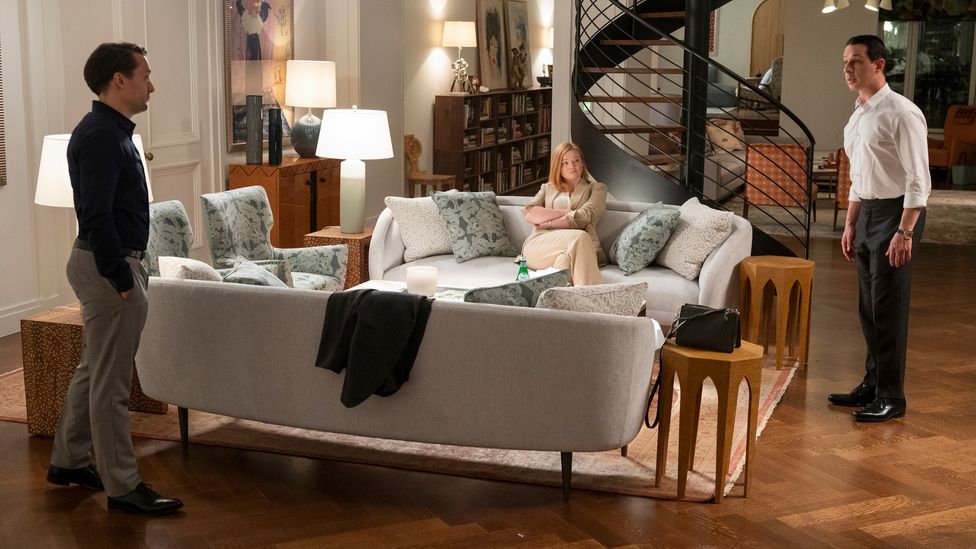
(Credit: David Russell/HBO)
Succession
After two years away thanks to the pandemic, this critical darling returned this autumn with what was undoubtedly a difficult third series – the chief difficulty being, where did this tale of corporate amorality and diseased democracy have left to run? The answer is, in many ways, nowhere: what we saw was more of the same endless cycle of power-plays among the Roy family, which led more than one critic to conclude that the show, in its sheer stasis, was really a sitcom disguised as a prestige drama. Except set against that was the genuinely tortured and tortuous-to-watch performance of Jeremy Strong (dissected in a now-infamous New Yorker profile), his staring into the emotional abyss coming to a head in a finale which saw him collapsed on the ground outside a Tuscan palazzo, ruined by the weight of his guilt and self-loathing. This run undoubtedly showed up the show’s limitations and deficiencies, notably its decision to marginalise the real-world consequences of the Roys’ diseased reign, which seemed smartly reflective of its characters self-absorption at first, but now risks appearing glib. But it seems churlish to complain too much about a show that is still as exquisitely refined in its artistry as its characters are obscene. Available on Sky/Now TV in the UK and HBO Max in the US.
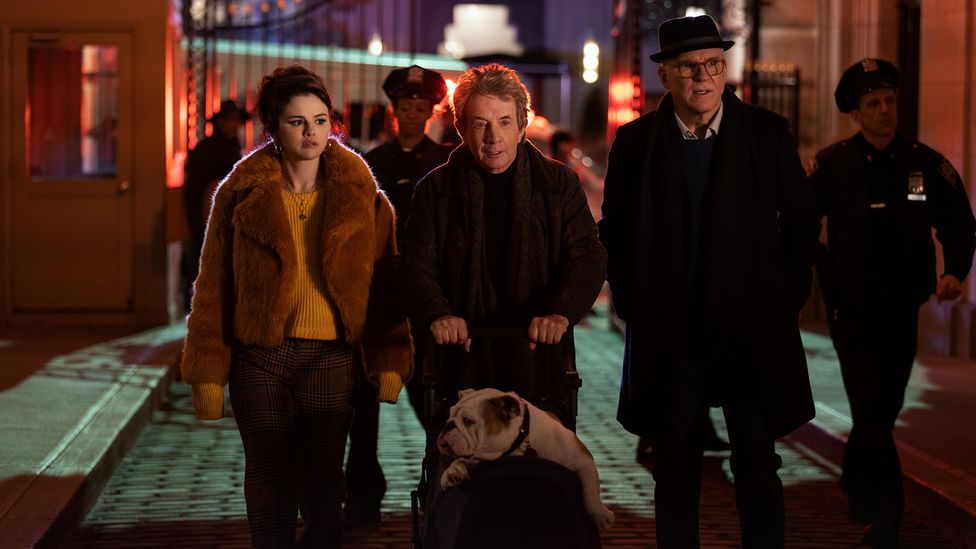
(Credit: Disney Plus 2021)
Only Murders in the Building
Amid all the epic television with something important to say out there, it’s nice to find a show that makes a virtue of its smallness – something like this murder mystery comedy, as sweet, moreish and easily digestible as a petit four. Steve Martin, Martin Short and Selena Gomez play the unlikely trio of amateur sleuths investigating a murder in their Upper West Side New York apartment block – with the 21st- Century conceit that they also decide to turn the case into a true-crime podcast. With its peppy, neurotic badinage, the whole thing is a little Woody Allen, though it has a sincere, open-hearted quality all of its own, while the two Martins’ familiar chemistry (founded on a long friendship and co-starring in films like The Three Amigos and Father of the Bride) is complemented perfectly by Gomez’s spiky charm. And as it rolls towards its denouement, it continues to be light on its feet, while being just consequential enough, in exploring themes like loss, loneliness, and friendship, to feel not altogether frivolous. The finale baldly sets up a new series – and in this case, there’s something about the show’s self-assurance of tone and character that means you don’t doubt that a second run will be just as much of a delight. Available on Hulu in the US and Disney+ internationally.
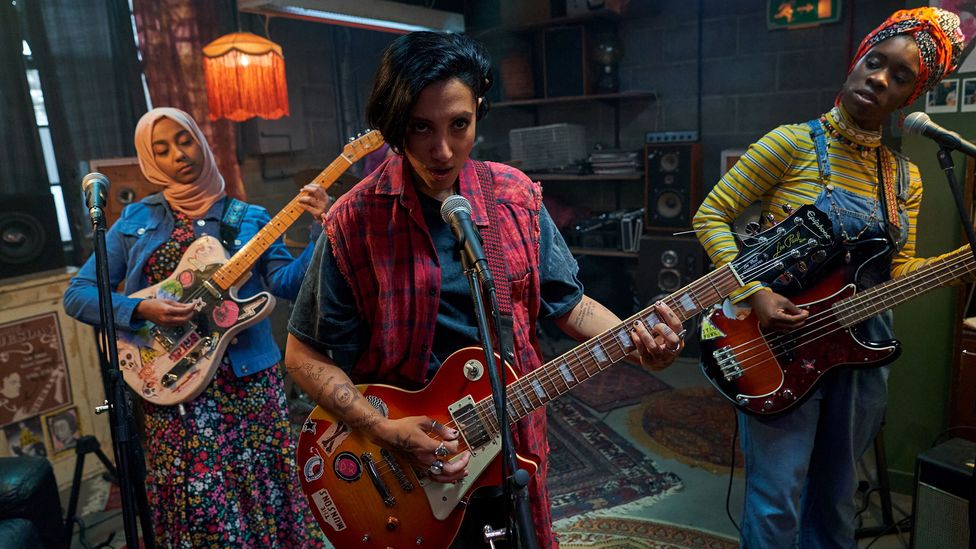
(Credit: Channel 4)
We are Lady Parts
Forget abstract conversations about representation and diversity in TV – and instead turn to this comedy about an all-female, all-Muslim punk band in East London for a showcase in how giving a platform to hitherto unheard voices and experiences is not only right, but can result in singularly exhilarating TV. Written by Nida Manzoor and inspired by aspects of her own life and upbringing, through its six episodes it is a total blast from start to finish. Anchored by an astonishingly deft and expressive comic performance from Anjana Vasan as Amina, the band’s new-recruit guitarist, it also features some inspired and rip-roaring tunes written by Manzoor and her siblings. Arguably, no show this year was quite as joyous. Available on All4 in the UK and Peacock in the US.
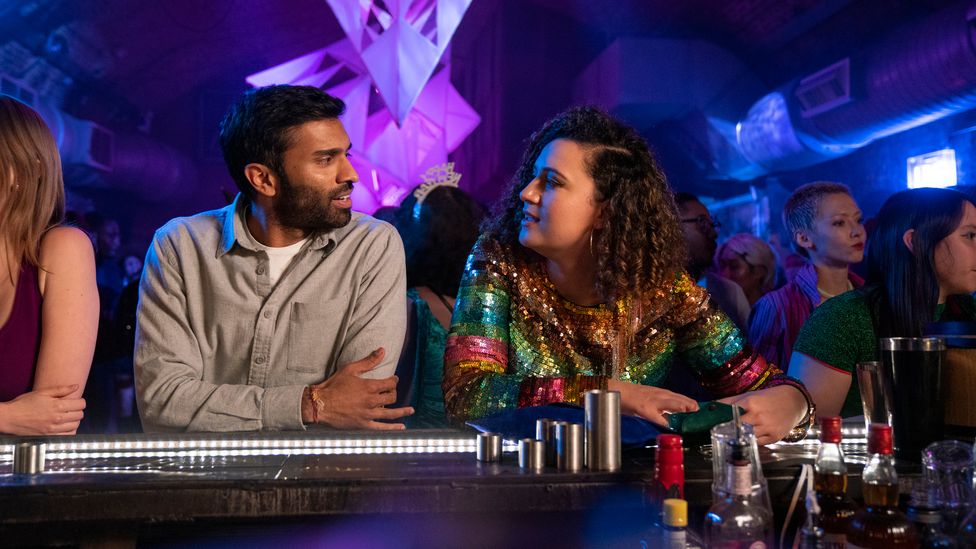
(Credit: Mark Johnson/HBO Max)
Starstruck
Starstruck begins, as most romantic comedies do, with a meet-cute. Jessie – juggling two jobs in London to scrape a living – hooks up with Tom, after meeting him in a nightclub on New Year’s Eve. But what she doesn’t realise is that Tom is an internationally-famous actor. After being mistaken for his cleaner by the paparazzi camped outside his house, Jessie (New Zealand comic Rose Matafeo, who also created and co-wrote the series) must confront her deepest insecurities, and come to terms with the surreal situation of having a relationship with a megastar, all while making terrible life decisions. This rom-com hits all the right notes, Matafeo is a turbulent but loveable hero you can’t help but root for, and Nikesh Patel is convincing as an uncomfortable star yearning for normality. Aside from the main storyline about the couple, one of this series’ greatest attributes is its exploration of friendship. Being from New Zealand, Jessie has been forced to create an alternative family in London, and her relationship with housemate Kate (Emma Sidi) is a delightful portrait of modern female friendship, with all the highs and lows involved. Shortly after its debut, Matafeo announced on Twitter that filming had already begun for the second series, so expect to see more of this hilarious and endearing sitcom soon. Available on BBC iPlayer in the UK and HBO Max in the US.
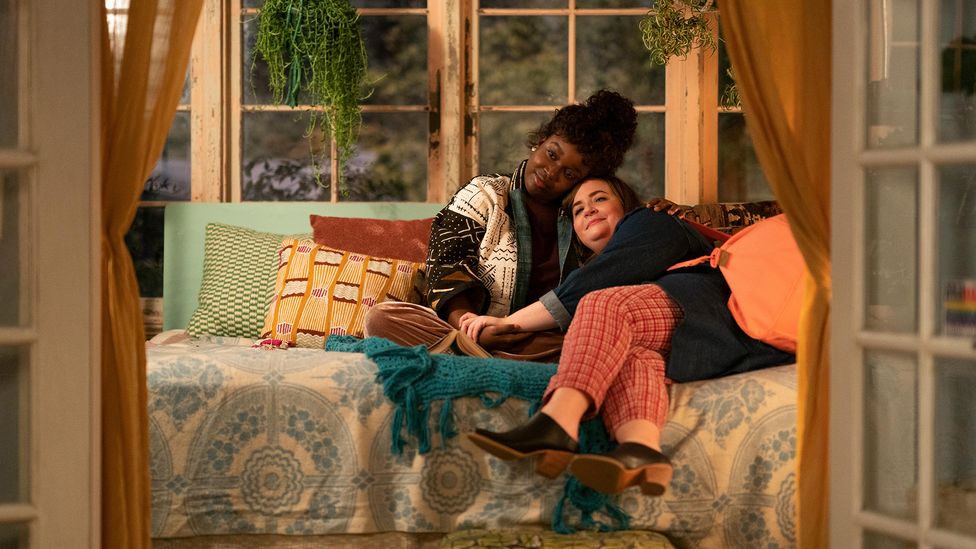
(Credit: Allyson Riggs/Hulu)
Shrill
The third and final season of this quietly revolutionary comedy once again takes on huge topics, including racism, privilege and fatphobia, with a deft hand. Aidy Bryant’s Annie Easton, the protagonist based on writer Lindy West, from whose memoir the show is adapted, is finally comfortable in her own skin, able to express herself through her writing and empowered in her love life. But this self-assurance comes at a cost when Annie writes an opinion piece that appears to excuse racism, causing a deep rift between her and long-time best friend Fran (the inimitable Lolly Adefope). One of the best things about this series has been seeing Fran growing into the co-lead, with the show sympathetically exploring her relationship with Em (E R Fightmaster), as well as her personal growth as a standalone character. The supporting ensemble has continued to delight, with John Cameron Mitchell’s excruciating editor Gabe and Patti Harrison’s hilarious, one-liner-producing PA Ruthie stealing the whole show. During its three-season run, Shrill has pulled off what so many other comedies fail to do: be genuinely funny, heartwarming and diverse all at once. Available on BBC iPlayer in the UK and Hulu in the US.
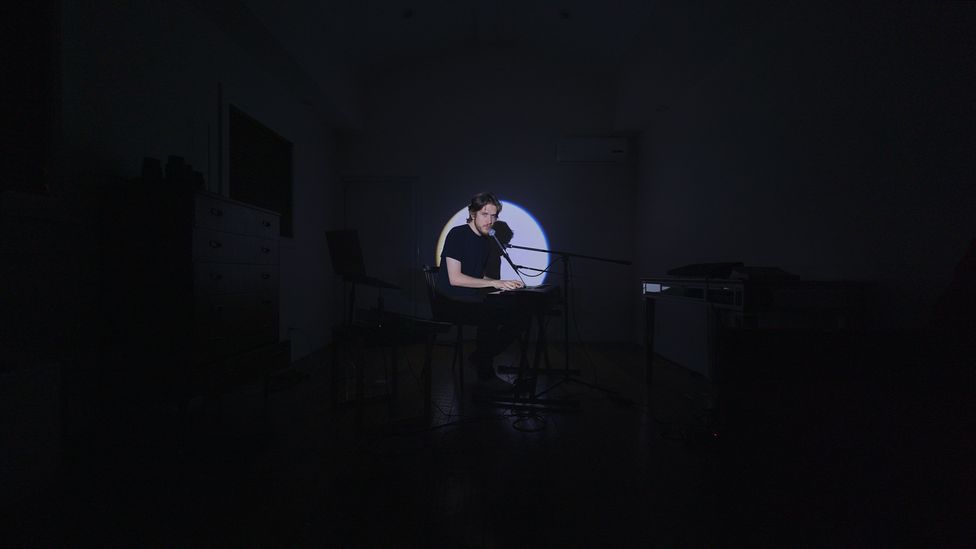
(Credit: Netflix)
Bo Burnham: Inside
In the face of lockdowns in March 2020, many made resolutions to use the extra time on their hands to “create”. And if Shakespeare wrote King Lear during a plague, so someone would conjure up a similar masterpiece this time around, it was pondered. Now, whether anyone thought said masterpiece would see comic Bo Burnham singing “I made you some content, daddy made you your favourite, open wide” while sat in his underwear, a head-torch lighting a disco ball, is doubtful, but a masterpiece his Netflix film Inside surely is. Burnham first made comedic waves on YouTube, writing and performing funny songs to audiences of millions throughout his high school years, before taking to stand-up, film direction (the brilliant Eighth Grade), and acting (Promising Young Woman). Inside marked Burnham’s first return to musical comedy performance since 2016, but instead of being on stage in front of a crowd of thousands, he wrote, shot, directed and edited this project entirely alone, in a single room, serving up an exploration of the horrors of both lockdown, specifically, and modernity, more generally. The sheer brilliance of the songwriting coupled with Burnham’s meticulously-crafted performances, which reflected the surreal nature of the last couple of years, made Inside potentially one of the defining pieces of pandemic art. Available on Netflix internationally.
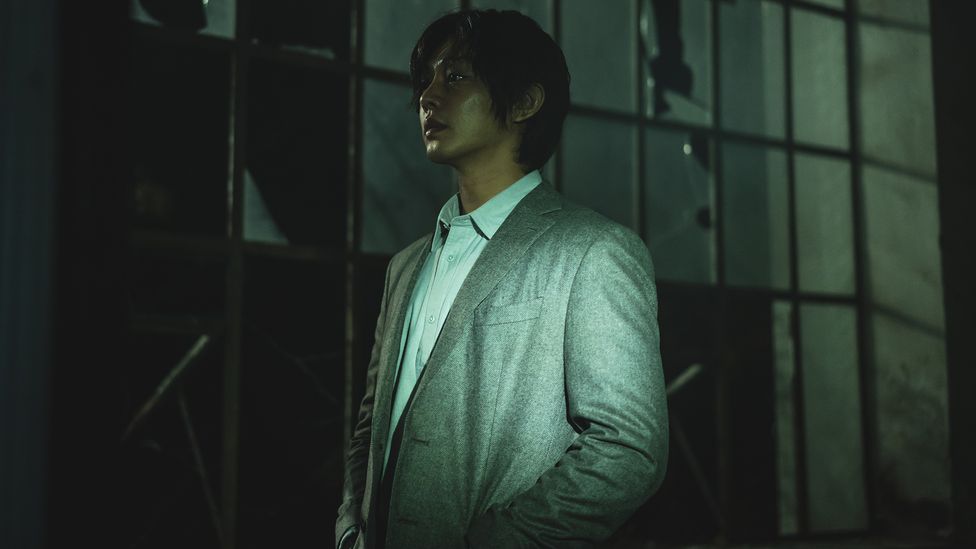
(Credit: Jung Jaegu/ Netflix)
Hellbound
In a year which felt like a turning point for mainstream popularity of non-English language TV drama, two South Korean dystopian dramas stood head and shoulders above the crowd. The first was the aforementioned Squid Game, and the other was Hellbound, a bizarre horror in which people suddenly receive a “declaration” from a disembodied face, telling them exactly when they will die and that they are destined for Hell. When the moment of their demise then comes, three hulking, smoking monsters appear out of thin air, kill the “sinner” in a spectacularly gruesome fashion, destroying whatever’s in their way, and burn the sinner to a crisp before disappearing seconds later. The sudden emergence of these terrifying monsters sees the equally terrifying rise of The New Truth, a religious organisation which claim to have the answers to who is chosen and why. Yoo Ah-in delivers one of the performances of the year as Chairman Jung, the frighteningly compelling leader of The New Truth, while Kim Hyun-joo’s Min Hye-jin is a consistently sympathetic heroine. Created by Yeon Sang-ho (Train to Busan), this horror series is much more than brutal monster gore; it’s a clever study of power, social media and misinformation and what fear will do to people. Here’s hoping a second season will be announced. Available on Netflix internationally.
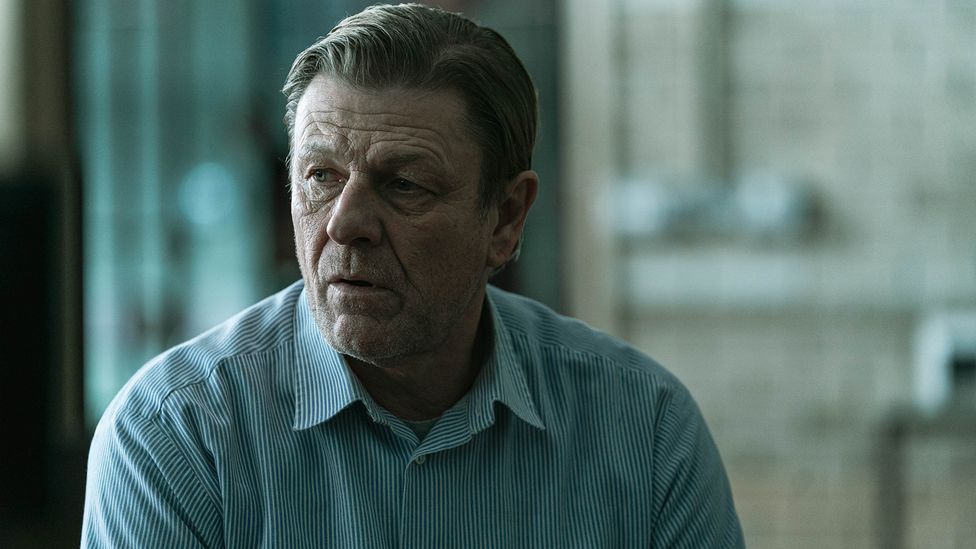
(Credit: BBC/James Stack)
Time
This magnificent three-parter takes a clear-eyed look at the harsh realities of prison life from the perspective of both prisoner and guard: Mark (Sean Bean) is a former teacher serving a four-year sentence for causing death by dangerous driving in a prison where Eric (Stephen Graham) is a rule-abiding officer. It’s not an easy watch; the programme unflinchingly covers a myriad of devastating topics including mental illness, suicide, addiction and violent bullying, and forces the viewer to reckon with their own preconceptions of prisoners. Ben is earth-shattering in his portrayal of a broken man who is trying to pick up the pieces of his life, while Graham’s offers a compelling portrait of the fragility of power, and the pain of trying to do the right thing. Time is British drama at its grittiest best: looking squarely in the face of one of the hidden parts of society and creating compelling, devastating art from it. Available on BBC iPlayer in the UK and Britbox in the US.
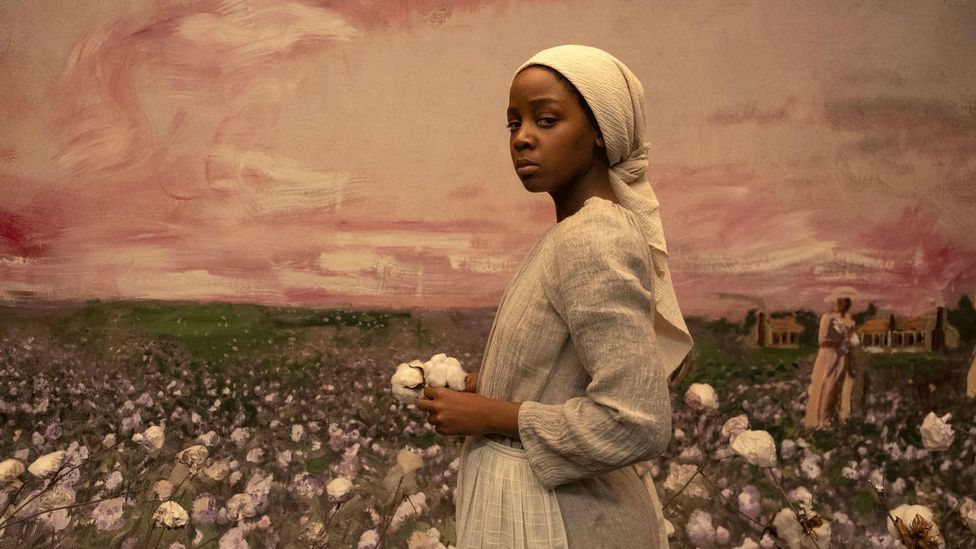
(Credit: Alamy)
The Underground Railroad
After a year in which many of us have gravitated towards “comfort TV” as a salve for the tumult around us, The Underground Railroad was perhaps the necessary counterbalance: a profound piece of art, as beautiful as it is uncompromising, that urges the very deepest engagement. Based on Colson Whitehead’s Pulitzer-prize winning novel of the same name, its alt-history narrative follows Cora, a young woman in antebellum America who escapes from the plantation where she is enslaved via the titular underground railroad, a literal manifestation of something which in reality was a metaphor for the social networks that helped enslaved people to their freedom. What follows, as she ventures Gulliver’s Travel-like from region to region, is a stunning survey of the spectrum of racism, inequity, forced compromises and false dawns that black people in America faced, and continue to face, as intellectually detailed as it is viscerally brutal. Every element is perfectly judged, from the coiled intensity of Thuso Mbedu’s lead performance to the jarringly beautiful, gliding camerawork that somehow reflects the callous indifference of a society to the violence it sanctions – it is, quite simply, essential viewing, though we would advise taking it slowly, so as to let each of the 10 episodes really sink in. Available on Amazon Prime internationally.
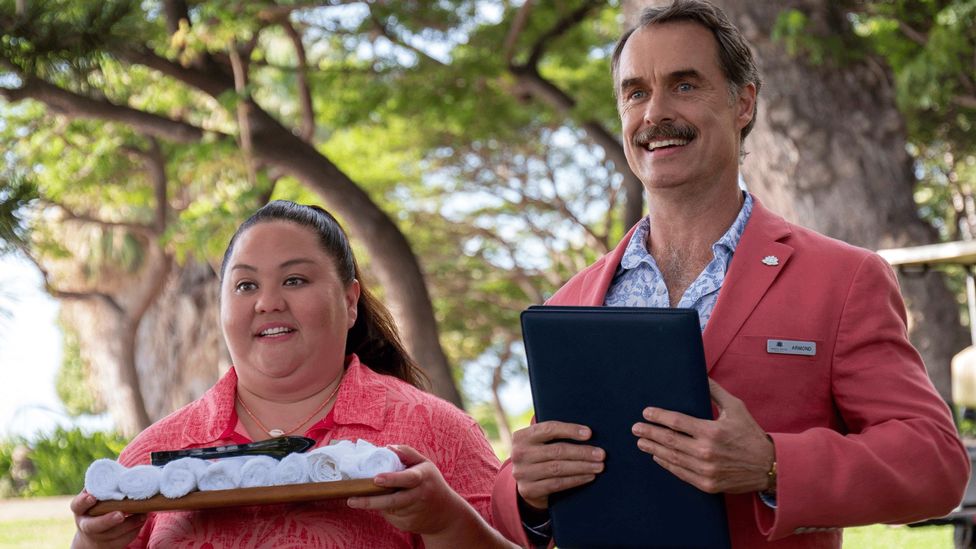
(Credit: Sky/HBO)
The White Lotus
There is a select group of people (including this writer) who have been banging on for years about the underappreciation and premature cancellation of Enlightened, the HBO comedy-drama from 2011-2013, starring Laura Dern as a middle-ranking executive for a conglomerate, driven to upset the applecart after a breakdown and a trip to a Hawaiian retreat. Well, clearly creator Mike White was simply a decade ahead of the curve, as his new show has comparable themes, elements and tonality, but has ended up being one of the summer’s great talking points. Where previously White focused on the after-effects of a tropical getaway, here the drama is firmly centred on the getaway itself: a luxury resort, again in Hawaii, where a group of mostly white, wealthy tourists are trying, and failing, to relax. As they project their unprocessed neuroses onto each other, and the endlessly trying-to-be-patient staff, it is clear that this holiday is not going to end well for anyone involved – something, to be fair, already given away by an introductory flash-forward scene featuring someone in a body bag. It’s a series that works on many different, interconnected planes at once – as a wincingly effective cringe comedy, a satire of American imperialism, and, complete with Cristobal Tapia de Veer’s eerie “Hawaiian Hitchcock” score, a nightmarish social horror. Perhaps its closest companion overall, in its trenchant study of unchecked privilege, is its HBO stablemate Succession – though White has made the distinction that “[with Succession] you can kind of otherize them. They’re billionaires. With White Lotus, I wanted it to be more, like, this is your next-door-neighbor rich person who is part of the system.” Certainly, though, it provokes similarly queasy laughter. Available on Sky/Now TV in the UK and HBO Max in the US.
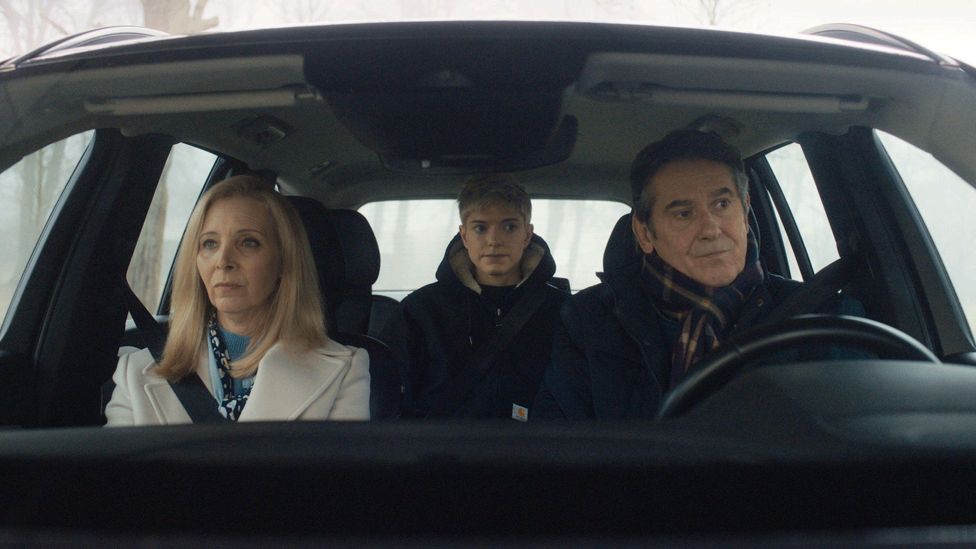
(Credit: Alamy)
Feel Good
It takes confidence to really shift the direction of a show from one series to the next, but that is what the brilliant comedian-writer Mae Martin has done with the second series of their semi-autobiographical comedy-drama. Where the first run set itself up as a romantic comedy centred on the contrasting lives, chemistry and combustions of nascent couple Mae and George (Charlotte Ritchie), the second is much more tightly-focused on a particular theme, as Mae faces up to the shadow cast by the harassment and abuse she has suffered – most centrally her grooming as a teenager by an older man who is now a friend. In exploring a reckoning with historic abuse, it feels timely, but in no way calculatedly so, and the fact it is rooted in autobiography is evident in the nuance with which it depicts Mae’s conflicting emotions. Indeed, for all the disarming charm of both its writing and its star, it feels of a piece with Michaela Coel’s I May Destroy You in its very singular study of trauma and its effects. Sadly – but probably rightly – there will be no more, but Martin, a gifted stand-up, surely has a big screen future ahead: indeed, they already have another Netflix show in the works. Available on Netflix internationally.
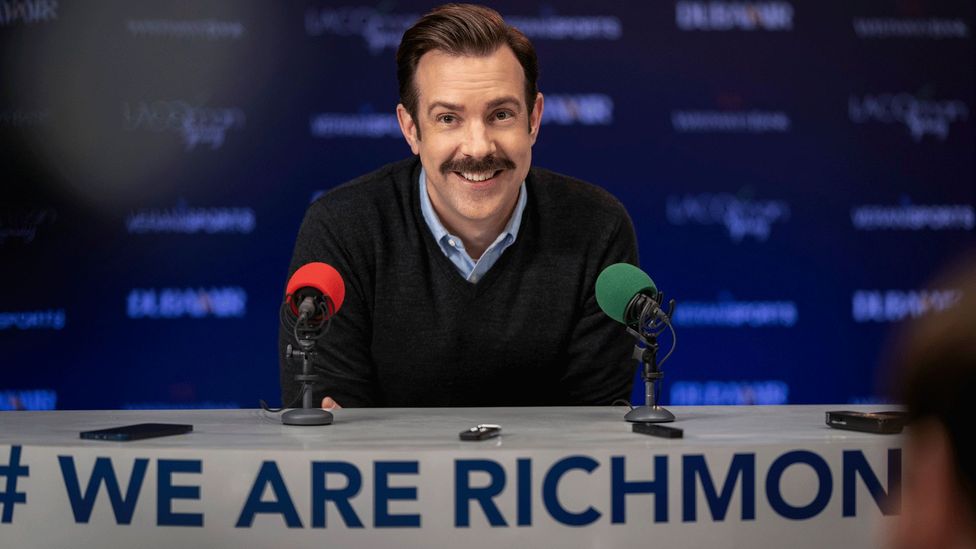
(Credit: Apple TV+)
Ted Lasso
Sometimes a TV show benefits from landing at just the right moment. Such was the case when Ted Lasso launched on Apple TV+ at the tail end of last summer: an unassuming sitcom on a still-novice platform, initially this tale of a supernaturally chirpy American football coach (Jason Sudeikis) taking charge of a British soccer team didn’t make much noise. But over a period of months, it grew to become a genuine word-of-mouth hit as audiences craved what it was offering amid the continuing real-world bleakness: not so much its humour as its sincerity, warmth and milk of human kindness. This year, it returned for a second series with a great deal more expectation in tow – but what’s great is how unaffected by such pressure it seems. Instead, it continues in the same beguilingly easy groove, and if it’s rarely laugh-out-loud funny, that doesn’t really matter. This is a show that leaves you with that inimitable fuzzy feeling, for its enveloping spirit of camaraderie, its unfettered love for its characters and its satisfying (if not unpredictable) subversion of stereotypes, from seemingly-hyper-macho-but-secretly-softie retired captain Roy Kent (Brett Goldstein) to sharp-as-a-tack glamour model-influencer Keeley (Juno Temple). And it also knows how to stage a crowd-pleasing moment, such as in this series’ third episode, with the team’s eminently admirable stand against an unethical sponsor. With its haul of Emmys in September, it may no longer be the plucky underdog, but it’s a worthy champ. Available on Apple TV+ internationally.
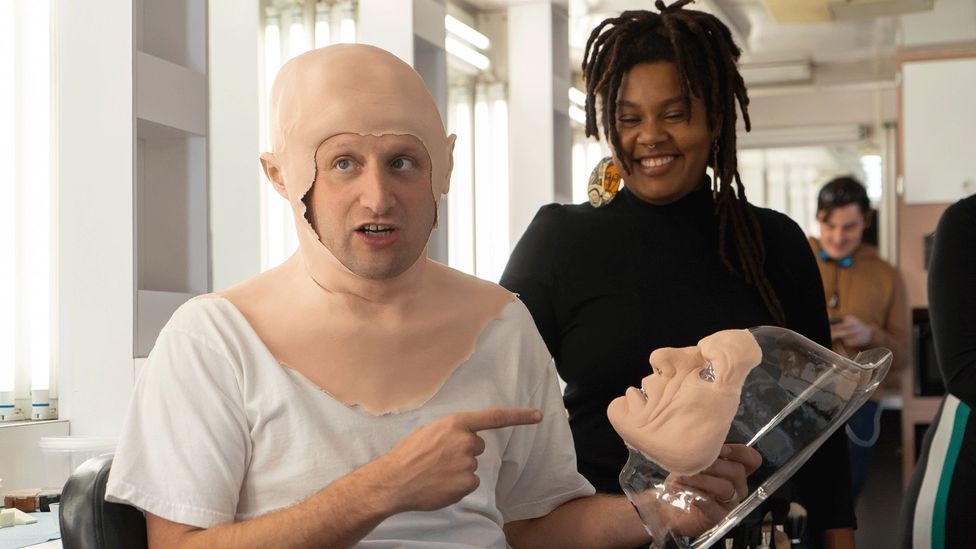
(Credit: Alamy)
I Think You Should Leave
By contrast, if you’re looking for a comedy that takes a rather dimmer view of humankind, then US comic Tim Robinson’s surreally electric sketch show I Think You Should Leave, now on its second series, is just the ticket: like much sketch comedy, it’s scattershot enough that it is difficult to quite distil the essence of its genius, but if it nails one thing repeatedly, it’s the fragility of the social contract: from using needlessly crude language on a haunted house tour to stealing someone’s dinner across the restaurant table, characters repeatedly drive scenes of spiralling awkwardness with a breathtaking lack of self-awareness that is both excruciating and exhilarating in equal measure. Overall, there’s something perversely refreshing about its misanthropy: not only that of its characters, with their inability to behave graciously when interacting with their fellow humans, but that of the show itself, with its transgressive belief that, if truth be told, we are a species mired in our pettinesses and our pomposities. And as for the already infamous “Coffin Flop” sketch? Assuredly, once you’ve seen it, you will not even be able to read those two words together without a Pavlovian attack of the hysterics. Available on Netflix internationally.
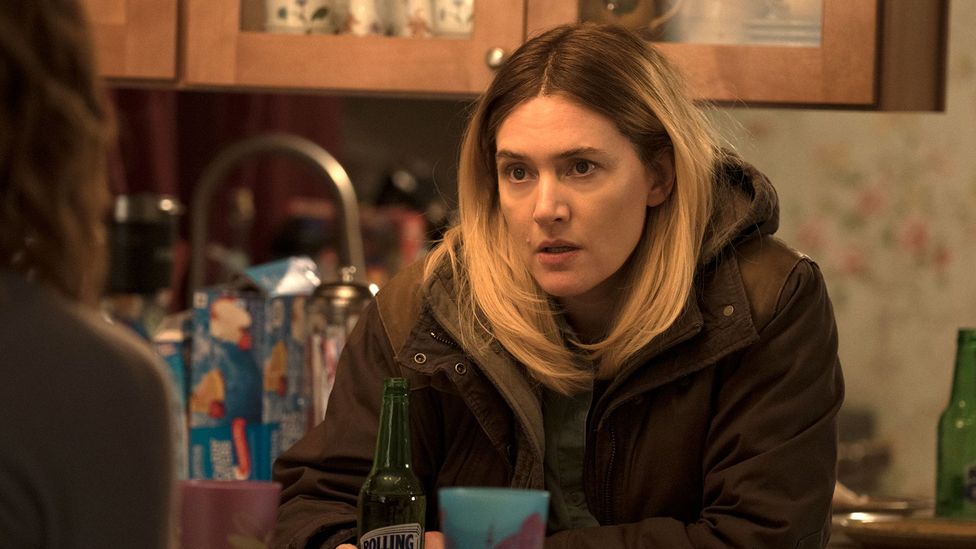
Mare of Easttown (Credit: Sky Atlantic)
Mare of Easttown
Both mesmerising and believable as a small-town Pennsylvania detective, Kate Winslet has made an unglamorous return to TV, a decade on from her only other small-screen appearance in Mildred Pierce, and it marks a career-best for the star. Set in the hometown region where screenwriter Brad Ingelsby grew up, the HBO crime series is essentially an old-fashioned whodunnit located within a close-knit working-class community that is weighed down by traumatic events. The story follows detective Mare Sheehan (Winslet) as she investigates the murder of a local girl while trying to cope with her own bereavement and divorce. Disappearing into the hard-boiled role, complete with an unbroken Delaware county “Delco” accent, Winslet shows us a woman who will do anything to protect her family and doesn’t suffer fools. Sure, there are red herrings aplenty, and jaw-dropping moments that lesser shows would simply end the series on, but aside from the Twin Peaks-style murder mystery element (hidden double lives, strange goings-on in the woods), the success of Mare is testament to Ingelsby’s writing allowing time for us to get to know the characters, as Mare and her tough-as-nails mother (Jean Smart) flit in and out of their neighbours’ lives, chatting with a beer around a dinner table, or chasing down every detail to find justice and help a town in turmoil heal. Available on Now TV/Sky Atlantic in the UK and HBO Max in the US.
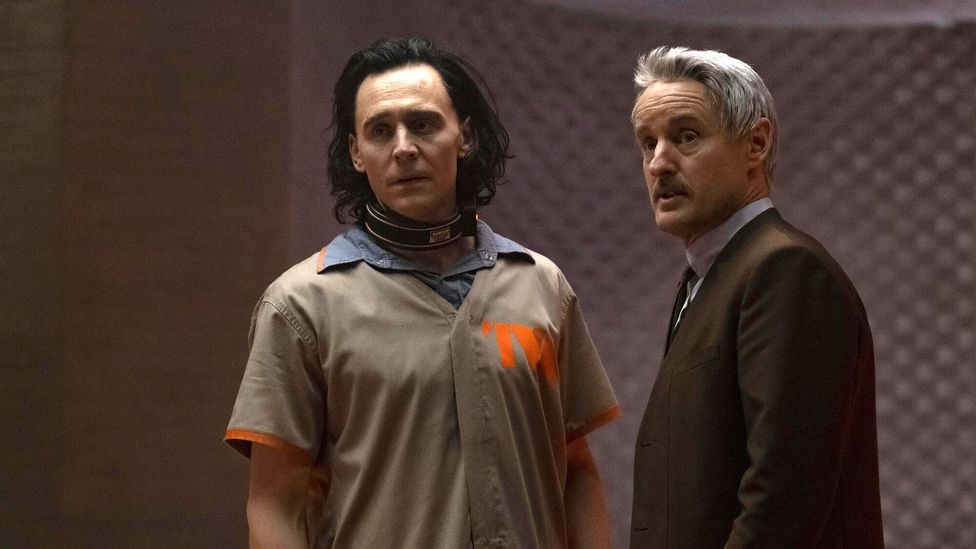
Loki (Credit: Disney+)
Loki
Following the success of the wonderful, oddball WandaVision earlier in the year, this latest much-anticipated Marvel series on Disney+ once again delivers, with a chaotic, time-hopping misadventure focused on Tom Hiddleston’s God of Mischief. Following on from the events of Avengers: Endgame, prince of Asgard, Loki, escapes imprisonment through a time portal using the powerful Tesseract, only to find himself in the clutches of the Minutemen, an elite team of soldiers working for the mysterious Time Variance Authority to track down any pesky variants disrupting the flow of time. Occupying a drab 1950s retro-futuristic style office, the TVA’s bureaucrats govern what they call “the sacred timeline” and eradicate or “prune” anyone who messes with reality. Loki comes to the attention of senior TVA agent Mobius (Owen Wilson), who arranges a reprieve from the court of Judge Renslayer (Gugu Mbatha-Raw), persuading her instead to allow him to recruit the not-entirely-trustworthy Loki to help repair the issues he has created in the timeline. Available internationally on Disney+.
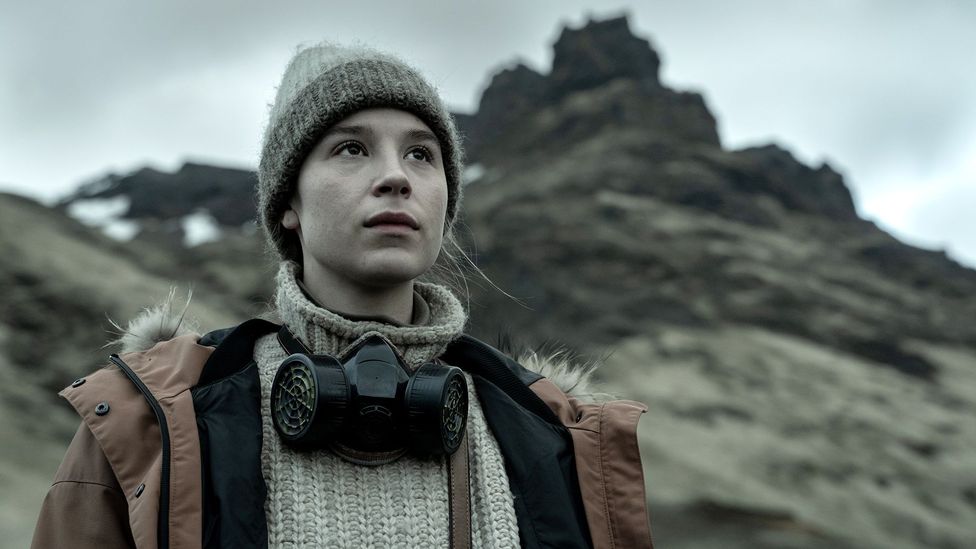
Katla (Credit: Netflix)
Katla
A supernatural mystery from Icelandic co-creators Sigurjón Kjartansson and Baltasar Kormákur who worked together on 2015 hit Trapped, Katla tells the story of a small community struggling to survive in the shadow of an active subglacial volcano. Rescue worker Gríma (Guðrún Eyfjörð), searches for her sister who disappeared the day Katla’s eruption started, over a year ago. Just as hope of ever finding her body fades, the remaining residents within the restricted area of Vík start to receive visits from unexpected guests from their past. An ash-caked woman appears on the glacier, but when taken to hospital it’s revealed she’s a Swedish woman named Gunhild (Aliette Opheim), who worked at a local hotel 20 years previous.Then another person materialises: Ása, Grima’s sister, thought to have been dead. The intriguing premise behind this series could so easily have devolved into derivative horror storytelling, but Katla’s blend of folklore, sci-fi and isolated, bleak setting allows for a series that is more than anything an exploration of loss, and whose deep mystery unravels slowly. Available on Netflix internationally.
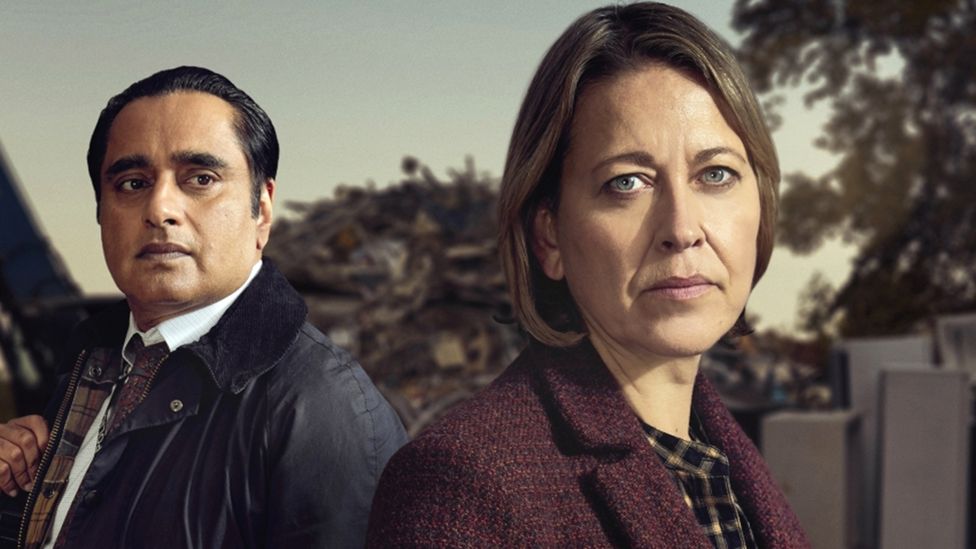
Unforgotten (Credit: ITV)
Unforgotten
Such is the glut of crime dramas, it’s difficult for any new show in the genre to truly stand out, but this exceptional British effort makes it look easy – proving that what you really need to elevate your procedural is not high concepts or clever-clever twists, but just beautiful and humane writing. Through three series, creator Chris Lang has used the premise of coppers DCI Cassie Stuart (Nicola Walker) and DS Sunny Khan (Sanjeev Bhaskar) investigating a years-old but newly-unearthed murder as a way to tell powerful stories of guilt, shame and regret – and this year’s fourth run, focusing on the discovery of a body on that links four former friends, who were all once trainee police officers, is no less powerful. Meanwhile the real highlight of the show again is the incredible central performance by Walker, one of the very most natural and organic screen actors there is. Extraordinary for being so ordinary, Stuart is not a tortured detective type but an exceptional, sympathetic yet understandably harried professional trying to do her best – and without giving anything way, this series makes us value her, and Walker, more than ever. Available on ITV Hub in the UK and on Amazon Prime worldwide.
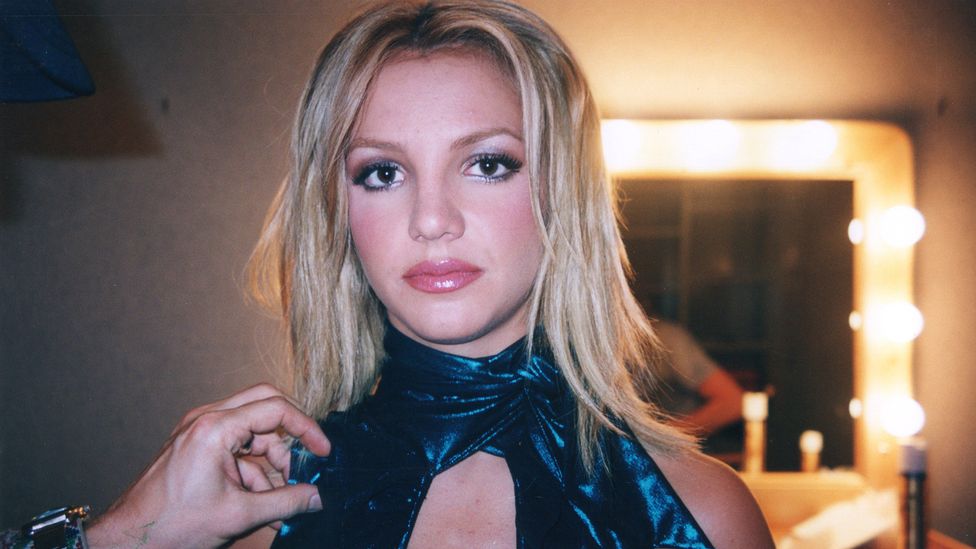
Framing Britney Spears (Credit: Sky Documentaries)
Framing Britney Spears
Rare is it that a piece of television comes along that feels quite as important as this New York Times-produced documentary about the pop icon, and her mistreatment over her two-decade long career from all sides: the press and paparazzi, the music industry, her own family and associates and everyone who has readily consumed her very public suffering as entertainment. When it premiered in February, it was the catalyst for a much wider discussion about the collective, abject sexism directed at young women in the public eye – a conversation that continued with Spears’ singing superstar peer Demi Lovato’s YouTube series Dancing with the Devil. And then, only last month, Spears finally escaped the conversatorship that had taken away her rights to make decisions about her life and career for the last 14 years. In light of this happy ending of a kind, this documentary nevertheless stands as an important historic testimony of one of the grimmest episodes in 21st century pop culture. Available on Sky Documentaries in the UK and Hulu in the US.
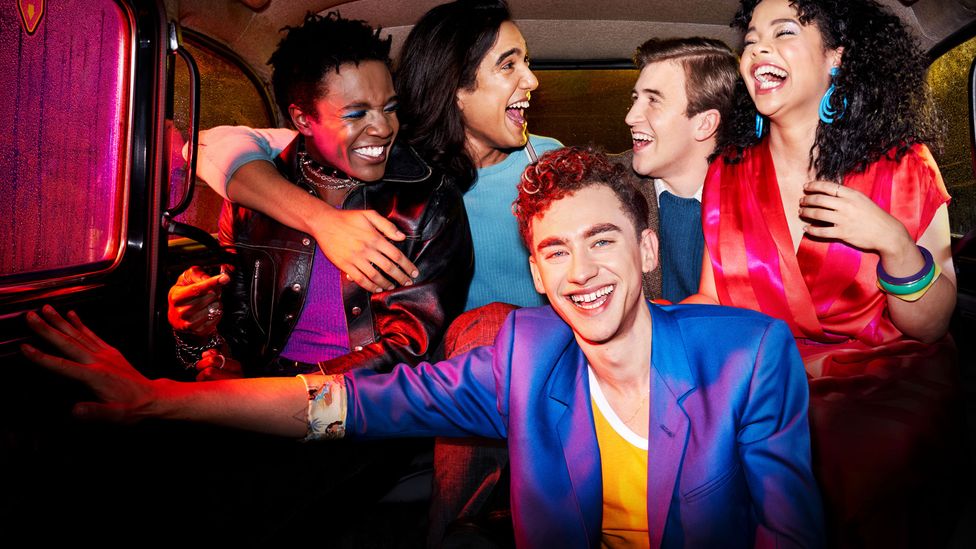
It’s a Sin (Cred: Channel 4)
It’s a Sin
From The Normal Heart to Angels in America, there have been a number of landmark works about the US Aids crisis of the 1980s, but not enough depicting the scourge of the pandemic elsewhere – which is what makes Russell T Davies’ six-part exploration of what was happening in the UK at the time so welcome. A co-production with HBO, it is a masterful blend of comedy, tragedy, and pop hits, which perhaps showcases Davies’ unique brilliance as a writer better than any show he’s done before: that is, his particular ability to combine the immense warmth and homeliness of a classic British soap with a righteous anger that gradually, then suddenly unfurls itself. A fine young ensemble includes Olly Alexander, Callum Scott Howells, and Omari Douglas as the central trio of young gay men, moving to the big city and with no idea what’s in store, while they’re supported by a fine selection of more experienced names, the best of all being Neil Patrick Harris as an impish Savile Row tailor. And if it’s depiction of how the victims of a pandemic were turned into pariahs would have cut deeply at any time, right now its resonance is even more gut-wrenching. Available on All4 in the UK and HBO Max in the US.
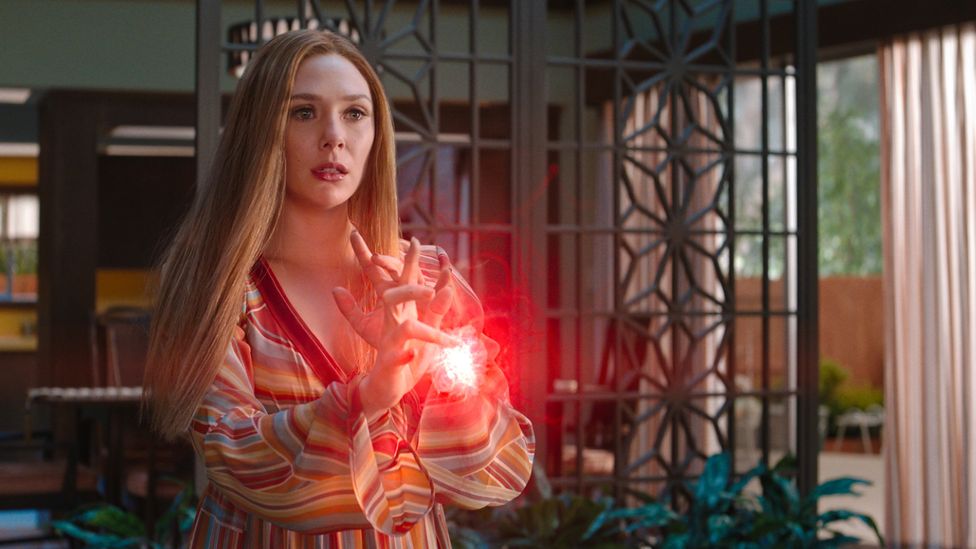
WandaVision (Credit: Disney+)
WandaVision
With Disney extending its Marvel Cinematic Universe to the small screen, it couldn’t really have created a better advert for the added creative possibilities therein. This marvellously surreal nine-episode limited series centres on Avenger Wanda Maximoff (Elizabeth Olsen), as she finds herself living in an ever-evolving alternate universe, modelled on various sitcoms through the eras, alongside her hitherto thought-to-be-destroyed robot husband Vision (Paul Bettany). Early episodes were such joyfully pinpoint pastiches of sitcom form that it is almost a shame when the show devolves into more typical Marvel fare in its latter stages. Nevertheless, it still counts as the MCU’s most daring move yet, a piece that both offers sharp meta-commentary on the medium of TV and a poignant exploration of grief. Olsen and Bettany navigate the tonal shifts masterfully as the titular couple, though it is long-time indie favourite Kathryn Hahn who steals the show – and furnished the memes – as jarringly enthusiastic neighbour Agnes. Available on Disney+ internationally.
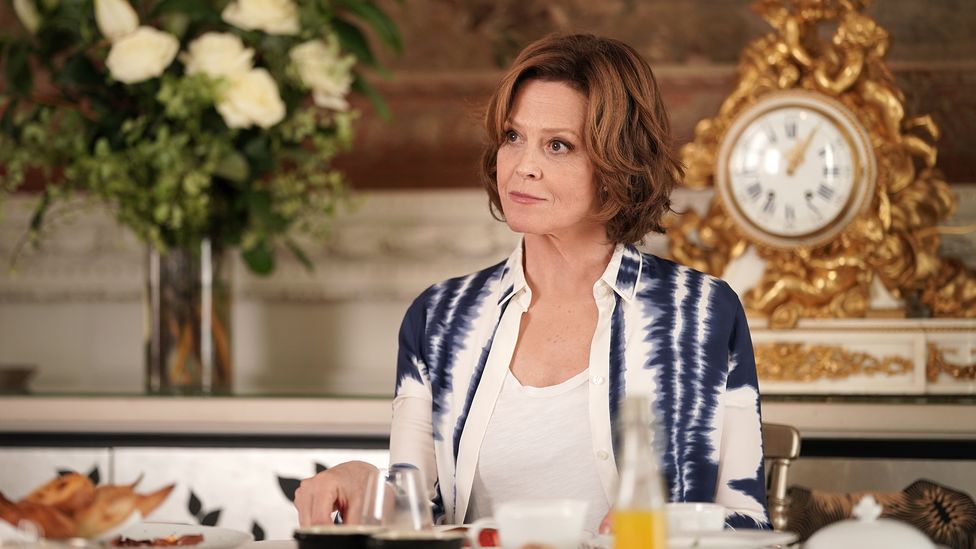
Call My Agent (Credit: Netflix)
Call My Agent
French TV is having a bit of a moment, with a number of series becoming international talking points – and chief among them is this stiletto-sharp comedy-drama about a Paris talent agency, whose fourth series premiered internationally on Netflix in January after broadcasting in France late last year. Its central conceit is that each episode features a particular client, who is in fact a real-life star playing themselves – and for the first time, this new run looked beyond France for its cameos, with a special appearance by Hollywood’s finest, Sigourney Weaver. Other than that, however, it is deliciously acerbic business as usual; as the BBC’s Will Gompertz noted it “maintains the same rarefied heights of excellence of the previous three, as our bold and increasingly beleaguered agents do battle with the corporate ogre that is StarMédia, an array of recalcitrant actors, and – mostly – each other. But though it was also purported to be the final series, fans will be glad to know that there has been a stay of execution: a fifth series and a standalone film have been confirmed. Available on Netflix internationally.
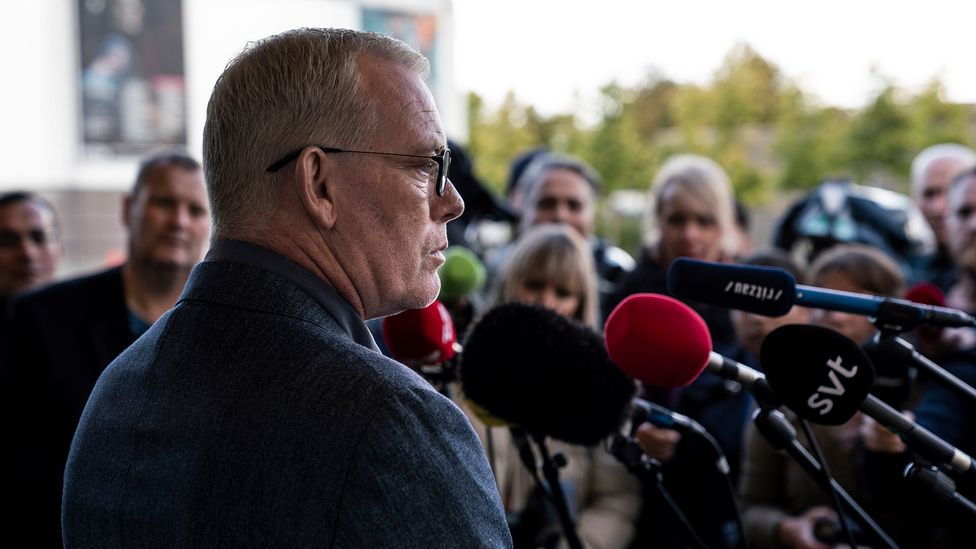
The Investigation (Credit: BBC Four)
The Investigation
Over six detailed and sober episodes we never meet the killer – and we don’t hear his name. In this retelling of the real-life investigation into the murder of Swedish journalist Kim Wall, Borgen actor Søren Malling leads the cast as Jens Møller, the stern Head of Homicide for Copenhagen police. Alongside chief prosecutor Jakob Buch-Jepsen (fellow Borgen star Pilou Asbæk), Møller works non-stop to prove beyond reasonable doubt that Wall, last seen going to interview an inventor for a story on a homemade submarine in Copenhagen harbour, was indeed murdered. In telling the story of how people worked together to solve a crime, without reproducing the gruesome crime itself, director Tobias Lindholm’s understated dramatisation of the ‘submarine case’ became a radical reinvention of the true-crime genre. In a behind-the-scenes podcast, Lindholm explained that in focusing on the professionals – the divers, forensics, investigators – making sacrifices and missing important time with family to tirelessly do get the job done, it was a way to “humanise the dehumanised… and offer a confrontation with our behaviours as media consumers”. Available on BBC iPlayer in the UK and HBO Max in the US.
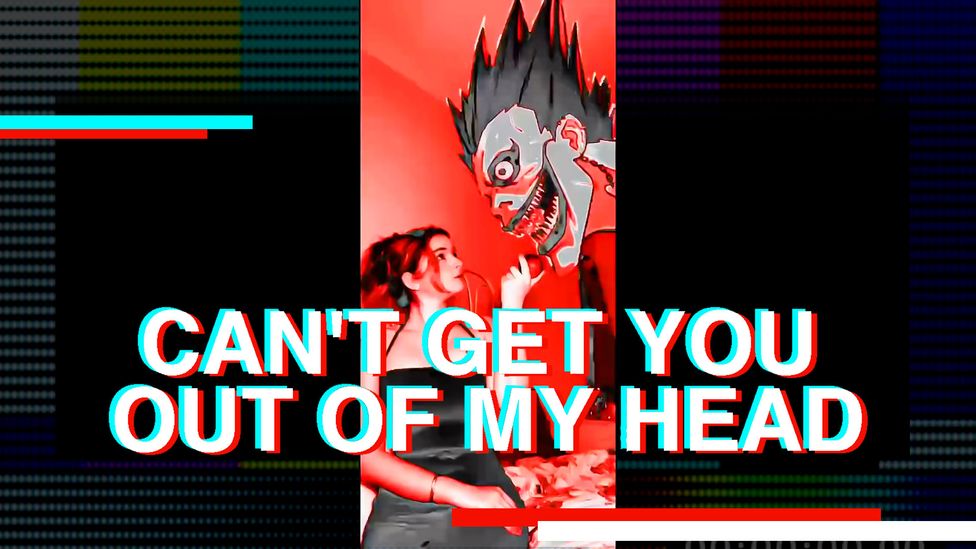
Can’t Get You Out of My Head (Credit: BBC iPlayer)
Can’t Get You Out of My Head
In a sprawling six-part series for BBC iPlayer, British journalist Adam Curtis reflects on how in the age of the individual, fundamental power structures governing us all haven’t gone away. Tracing the different forces that have led to now, over eight hours the wide-ranging films chronicle the growing anger and anxieties in China, Russia and the Western world, and how this came about. Featuring off-beat archival footage of figures in politics and culture – soundtracked with Curtis’s signature choice selection of pop music – the montage of film essays focuses on the loosely interconnected stories of historical revolutionaries. Telling the individual tales of Jiang Qing, Afeni Shakur, Edward Limonov, and Michael X, filmmaker Curtis sets out the argument that it was all of us – self-expressing individuals, politicians and technocrats – who together made these strange times we’re living through. It doesn’t provide any answers, but through his typical dazzling, yet untraditional collage documentary format, Curtis does at least offer us an explanation of the dynamics of our time. Available on BBC iPlayer in the UK.
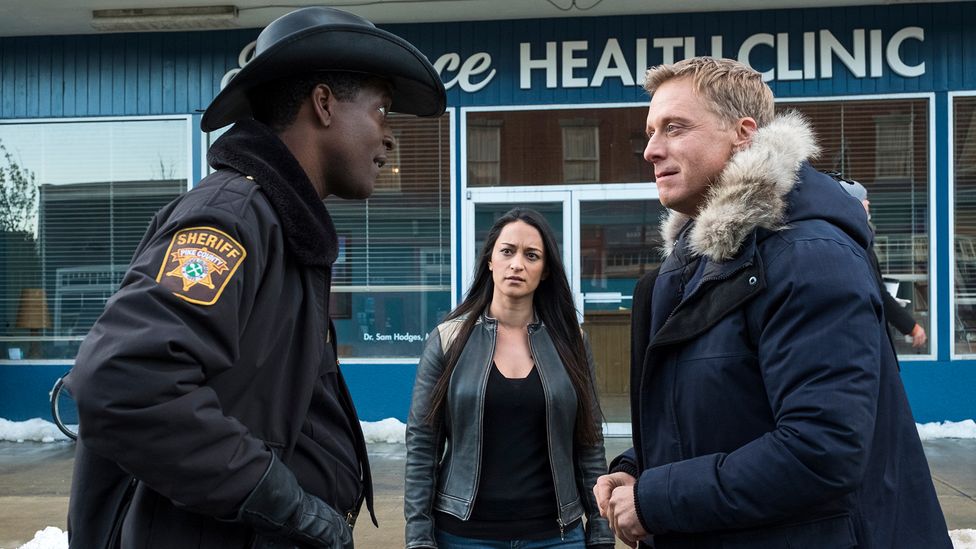
Resident Alien (Credit: Sky Atlantic)
Resident Alien
Far funnier than its farcical premise should allow, this comedy-drama based on the Dark Horse comic series provided much-needed escapism and so became Syfy’s highest-rated new drama in recent years. Alan Tudyk (Firefly) stars as Harry Vanderspeegle – real name unpronounceable – an alien who, after crash-landing in the mountains outside the small town of Patience, Colorado, has killed and taken the physical form of the first man he encounters. After a stint alone in a fishing cabin learning English by watching Law & Order reruns, we learn that Harry’s secret mission on Earth is to destroy humanity – but he’s lost his detonation device in the mountains, so he needs to assimilate into his new home to buy some time to uncover it. Tudyk brilliantly reveals the alien’s flawed personality, flicking between comedy and menace with ease, as we follow Harry posing unconvincingly as a human doctor. Things, however, are going to plan, until Harry gets embroiled in solving a local murder (“Chung chung!”), bringing him closer to the townsfolk and especially workmate Asta (Sara Tomko), while he also discovers a love of pizza. As time goes on, Harry begins to wrestle with the moral dilemma of his mission. Available on Sky/Now TV in the UK and SyFy in the US.
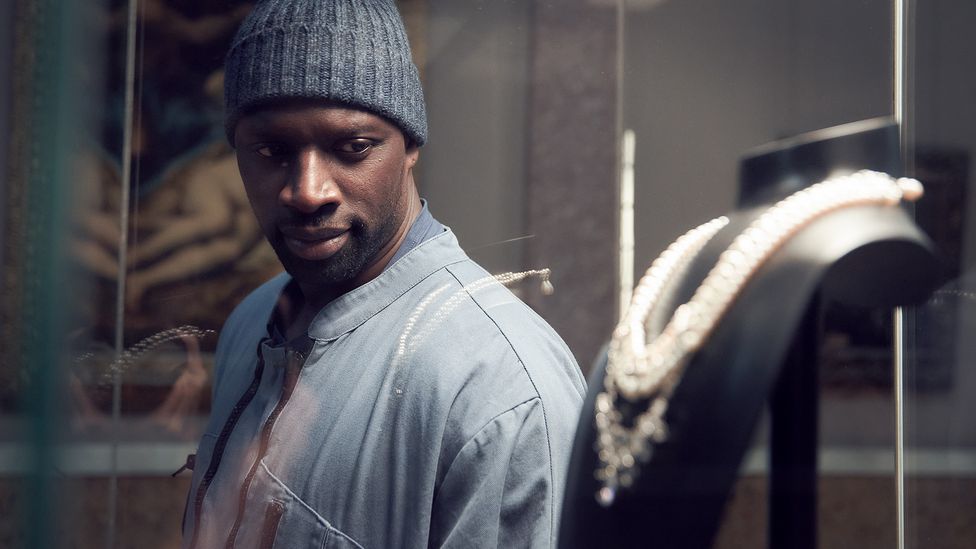
Lupin (Credit: Netflix)
Lupin
One of the year’s first hit shows was the delightful high-energy French heist comedy, inspired by classic stories of gentleman thief Arsène Lupin, written in the early 1900s. Many binged the slick and fast-moving series, released in two halves of five episodes each, and it’s not difficult to see why: Actor Omar Sy oozes charm as Assane Diop, a towering con artist with the smooth style of Bond and the wits of Sherlock, who sets out to avenge his father for an injustice inflicted by a wealthy family. As the only son of an immigrant from Senegal who had come to France to seek a better life, his father is framed over the theft of a diamond necklace by his powerful employer, Hubert Pellegrini. After his father dies in prison, teenager Assane is left an orphan. When we meet Assane 25 years on, inspired by a book about a certain gentleman thief his father had given him on his birthday, our hero sets out to right a wrong, using his mastery of disguise and subterfuge. Available on Netflix internationally.
Love TV? Join BBC Culture’s TV fans on Facebook, a community for television fanatics all over the world.
If you would like to comment on this story or anything else you have seen on BBC Culture, head over to our Facebook page or message us on Twitter.
And if you liked this story, sign up for the weekly bbc.com features newsletter, called The Essential List. A handpicked selection of stories from BBC Future, Culture, Worklife and Travel, delivered to your inbox every Friday.








